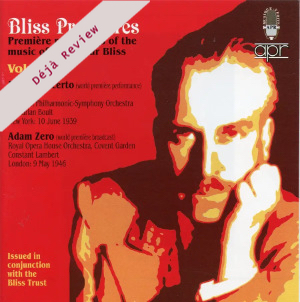
Déjà Review: this review was first published in July 2003 and the recording is still available.
Sir Arthur Bliss (1891-1975)
Premières Volume 1
Piano Concerto (1938-39)
Adam Zero (1946)
Solomon (piano)
New York Philharmonic Symphony Orchestra/Adrian Boult (Concerto)
Royal Opera House Orchestra, Covent Garden/Constant Lambert (Adam Zero)
rec. 10 June 1939 Carnegie Hall, New York, (Concerto); world premiere broadcast on 9 May 1946 (Adam Zero)
APR 5627 [56]
Bryan Crimp’s renowned work in researching and making available historic musical events for CD takes an impressive step forward with this disc of the world premiere performance of Bliss’s piano concerto. The original acetate disc recordings are in the International Piano Archives at Maryland USA, repository of much significant archival material relating to the instrument. Despite unavoidable deterioration over the years it is possible to experience once again the thrill of the occasion from the discs, and where small parts went unrecorded (during the interchange between a pair of turntables) patching has been used from Solomon’s 1943 recording for HMV with Boult and the Royal Liverpool Philharmonic Orchestra. The shellac recordings of movements from Adam Zero come from the composer’s widow. Any hiss and crackle only adds to the flavour of the historical context, so in this reviewer’s opinion, the transfers are absolutely first-rate in both works and a tribute to Mr Crimp’s labours of love. He has also written an excellent appreciation of Solomon, called ‘Solo’, which I commend highly to the reader.
Bliss wrote the concerto to a commission from the British Council in 1938 for performance at the British Week of the New York World Fair in the summer of 1939. He had been a juror the previous year on the Ysaÿe International Piano Competition and came away highly impressed at the standard of virtuosity of the competitors. Clearly this was still affecting him when he wrote his concerto. It is an awesomely difficult work neatly summarised by Nicolas Slominsky as ‘Lisztomorphic in its sonorous virtuosity, Chopinoid in its chromatic lyricism, and Rachmaninovistic in its chordal expansiveness’. Solomon’s playing has unerring accuracy and confident abandon from the very start, and it is hard to believe that Bliss had to give him a gentle push on to the stage of a stiflingly hot Carnegie Hall because he was too nervous to go on. Boult is a marvellously sympathetic and supportive accompanist, and the orchestra play with a naturalness which belies what must have been unfamiliarity with the Bliss idiom. Later exponents of the concerto were Gina Bachauer, Trevor Barnard, Noel Mewton-Wood and, nearer to our own day, John Ogdon and Philip Fowke but it must have been a hard act to follow even this baptismal performance by Solomon.
Adam Zero is the third of Bliss’s full-length ballets (after Checkmate 1937 and Miracle in the Gorbals 1944), and in Wilfred Mellers’ view ‘the element of physical movement’ in the dance picks up with Bliss where Purcell left off … quite a leap in time. Adam Zero is an allegorical comparison between a man’s life and the four seasons from birth (Spring), maturity and marriage (Summer), middle-age and mid-life crisis (Autumn), to death (Winter). The immediate post-war years were not propitious ones for such subject matter (it had only 19 performances over two seasons whereas his two earlier ballets had 37 between them). Also choreographer Robert Helpmann infused little traditional choreography into the ballet (whose audiences are tough to please). The composer suffered a considerable disappointment with the reception of this work. Nevertheless, the music remains highly attractive (especially the Night Club Scene), especially in the hands of its dedicatee Constant Lambert. Lambert’s reputation as a conductor has always been high but is further vindicated in this world premiere broadcast of half the ballet (ten numbers). One can imagine listening to the wireless on that Spring evening over half a century ago.
Christopher Fifield
If you purchase this recording using a link below, it generates revenue for MWI and helps us maintain free access to the site



















